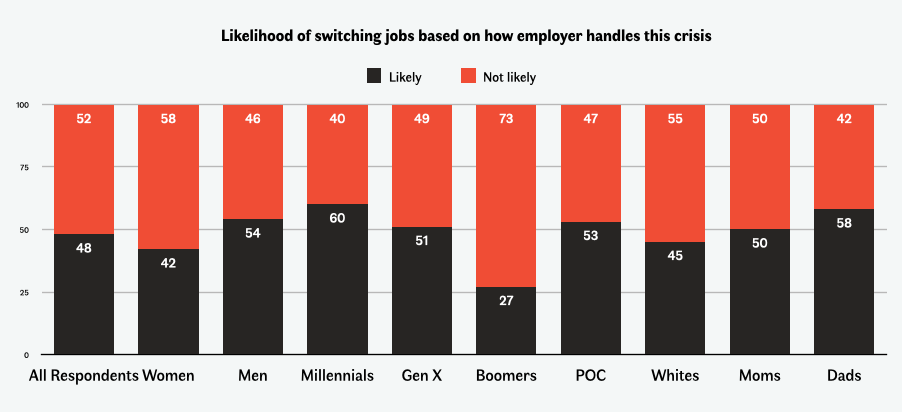Male and Female Workers Are Experiencing COVID-19 Very Differently
For employers, the pressure’s on to keep staff safe and happy as the world adapts to remote work. A new report illustrates how they’re doing, and the various ways both men and women workers need more support.

Today’s workday looks nothing like it did two months ago. Employees are working remotely, meetings are taking place over phone and video, and staffers aren’t just juggling their workloads — they’re juggling their households, their kids and their kids’ workloads, too. So how are we all really doing? Well, it depends on who you ask.
Have Her Back, a consultancy that aims to help companies achieve gender equity, conducted a study that surveyed employees of mid to large companies at the end of March to better understand how they (and their employers) were adapting to our new way of getting work done. The report examines the critical needs and support employees are seeking, and highlights how gender, parenthood and generation may inform their concerns at this time — and how they want their employer to respond, both now and in the future. Here are some key insights.
Men are more satisfied with their employers’ existing work-from-home policies…

Overall, 35 percent of men thought their company’s response to the crisis was “excellent,” while just 24 percent of women applied the same praise. That gap widened when Have Her Back focused in on parents; 51 percent of dads rated their resources excellent; just 18 percent of moms said the same.
RELATED: Due to Coronavirus, Will Remote and Distributed Work Become the Future for Office Workers?
…but all working parents struggle with caregiving — especially dads.

It’s no secret that effectively juggling kids (and school!) and a job from home is a nearly impossible task, and respondents agreed. But 31 percent of fathers said they find it “extremely difficult,” compared to just 14 percent of mothers, suggesting that dads were perhaps unaware of just how heavy a lift day-to-day childcare and education is.
Women still feel they’re carrying most of load.

Employees of both genders are craving more, but very different, support.

As our world weathers this pandemic, working mothers most want guaranteed income and paid sick leave (a fact that reinforces the earlier finding that more women feel that the weight of caregiving falls on their shoulders). Dads are craving morale-boosting communication from their bosses, as well as more training on remote work, supervision and management.
RELATED: 3 Core Values to Lead Your Crisis Communications Plan
The crisis is causing workers to think hard about their future.

When asked if they were likely to change jobs in the future based on how their employer handled the crisis, responses fell along generational lines. A massive 60 percent of millennials feel likely to change jobs because of their experience; 51 percent of Gen Xers felt the same, while just 27 percent of boomers will consider leaving their current post. That presents employers with a big opportunity as they move through the pandemic: The better they listen to and respond to employees’ needs, the stronger team they’ll be able to retain — and recruit — on the other side.
Today’s workday looks nothing like it did two months ago. Employees are working remotely, meetings are taking place over phone and video, and staffers aren’t just juggling their workloads — they’re juggling their households, their kids and their kids’ workloads, too. So how are we all really doing? Well, it depends on who you ask.
Have Her Back, a consultancy that aims to help companies achieve gender equity, conducted a study that surveyed employees of mid to large companies at the end of March to better understand how they (and their employers) were adapting to our new way of getting work done. The report examines the critical needs and support employees are seeking, and highlights how gender, parenthood and generation may inform their concerns at this time — and how they want their employer to respond, both now and in the future. Here are some key insights.
Men are more satisfied with their employers’ existing work-from-home policies…

Overall, 35 percent of men thought their company’s response to the crisis was “excellent,” while just 24 percent of women applied the same praise. That gap widened when Have Her Back focused in on parents; 51 percent of dads rated their resources excellent; just 18 percent of moms said the same.





